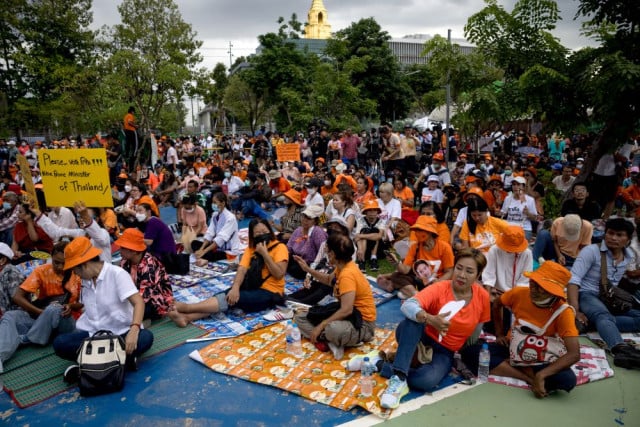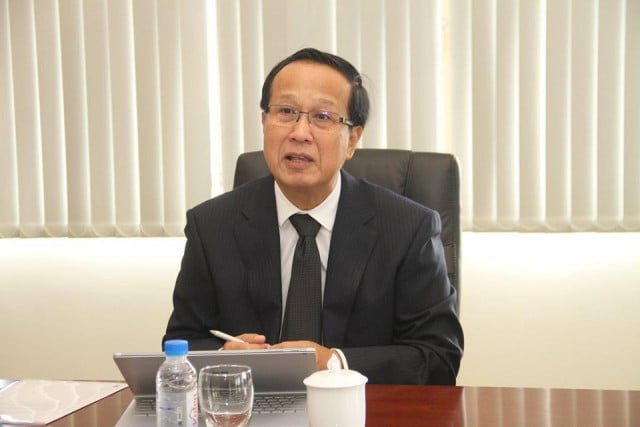Thailand's next PM: if not Pita, then who?

- By Agence France-Presse (AFP)
- July 14, 2023 9:01 PM
Bangkok, Thailand - The Thai parliament's rejection of reformist democrat Pita Limjaroenrat's bid for prime minister has sparked a flurry of behind-the-scenes jostling ahead of a fresh vote by lawmakers to elect the country's leader next week.
Pita's Move Forward Party (MFP) won the most seats in May elections but its pledge to amend the kingdom's strict royal defamation laws riled the establishment, leading to an emphatic rejection from military-appointed senators.
While Pita is adamant he will remain a candidate in Wednesday's second ballot despite facing the looming threat of parliamentary suspension, analysts say he is unlikely to succeed.
Here are some of the key players who could declare their own candidacy or play a significant role in the next vote:
- Srettha Thavisin -
Pheu Thai's candidate Srettha Thavisin, 60, found unexpected popularity as a fresh face in Thailand's political scene who appealed to younger voters on the campaign trail.
Liked by business leaders among Thailand's influential elites, he has been touted as a potential compromise candidate.
Under Pheu Thai's banner, he could command 151 votes in the parliament, and political analyst Thitinan Pongsudhirak told AFP that he was the frontrunner if Pita was ruled out.
He cautioned, however, that the businessman was not a very compelling candidate, especially as he "doesn't have a base in the party".
The property scion was educated in the United States and helmed one of Thailand's biggest property developers.
He is a confidante of Pheu Thai founder Thaksin Shinawatra and his sister Yingluck, both of whom served as prime minister before they were overthrown by the military.
- Paetongtarn Shinawatra -
Pheu Thai candidate Paetongtarn Shinawatra, 36, was written off as a dynast ahead of the election but proved an emotive and savvy campaigner, pulling in huge crowds and building on her family's legacy.
The third child of exiled former prime minister Thaksin Shinawatra -- ousted in a 2006 military coup -- has been outwardly supportive of MFP, along with her party.
Thitinan played down the chances of her candidacy, noting she had recently had a baby and could be damaged by the deep antipathy towards her father among Thailand's political establishment.
Before her political debut this year she studied hotel management in Britain and worked for the hospitality arm of her ultra-rich family's company.
She married commercial pilot Pidok Sooksawas in 2019 and the couple have two children.
- Anutin Charnivirakul -
Bhumjaithai party leader Anutin Charnvirakul, 56, has straddled Thailand's political divide and while unlikely to be a candidate for premier, could find himself thrust into the role of kingmaker.
He commands 71 seats in the lower house, and could choose to throw his support behind a fresh candidate after local media reported his decision to rule out supporting Pita.
Anutin hails from one of Thailand's wealthiest families and became the unlikely face of a successful move to legalise cannabis in 2022.
He has longstanding links with the Shinawatra clan and first entered politics as a member of Thaksin's government.
He became leader of Bhumjaithai in 2012 and later steered it into a coalition with coup leader Prayut Chan-o-cha's government in 2019, serving as health minister.
- Prawit Wongsuwan -
Dark horse Prawit Wongsuwan, 77, is known for his skills as a quiet backroom political operator.
His Palang Pracharath Party is backed by the military and commands 40 votes in parliament.
Prawit rose through the ranks to serve as army chief from 2004 to 2005 and has been a consummate political player behind the scenes in the years since.
He was appointed to the National Legislative Assembly after the 2006 coup, then in 2008 he was defence minister under the establishment Democrat party.
Prawit went on to be one of the chief architects of the 2014 coup, serving as deputy prime minister to Prayut and allying himself closely with the junta leader until the pair fell out.
lpm-rbu/gle/aha
© Agence France-Presse















